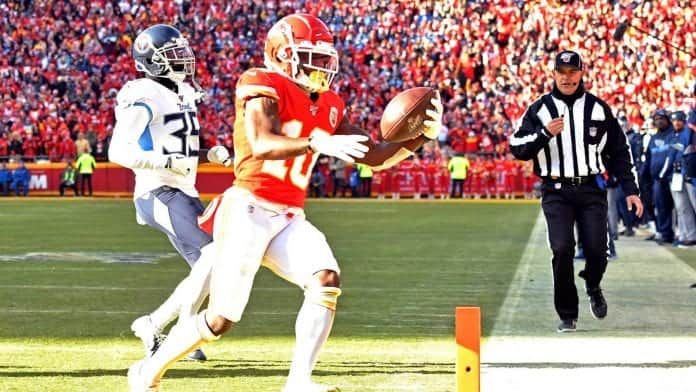Tyreek Hill played a pivotal role in the AFC Championship game, but the Kansas City Chiefs’ star receiver will face one of the most stringent tests of his career versus the San Francisco 49ers in the Super Bowl.
The Chiefs’ speedster did not post the gaudy yardage totals that have become a theme of his incredible NFL career, catching five passes for 67 yards, but Hill still had a decisive impact as Kansas City progressed to the Super Bowl for the first time in 50 years.
His two touchdowns proved critical in a 35-24 win over the Titans and helped him earn a Pro Football Network Offensive Share Metric (OSM) grade of 37.69.
OSM uses NFL’s NextGen Stats and a series of algorithms to measure a player’s contribution to his offense’s production. Hill’s score indicates a very good level of performance and was, predictably, a product of his speed but also his refined approach to route running.
After a fast start from the Titans, Hill got Kansas City on the board with an eight-yard score on a pop pass from Patrick Mahomes. According to NextGen Stats, Hill reached 21.27mph on his first touchdown, his speed allowing him to evade a penetrating edge defender and turn the corner.
While Hill relied solely on his raw physical gifts for the Chiefs’ opening score, there was more nuance involved in his second touchdown, his excellent release helping him get open downfield and haul in a 20-yard pass from Mahomes to reduce the Titans’ lead to 17-14.
Hill demonstrated similar ingenuity in the fourth quarter on a 15-yard catch and run that set up a Damien Williams touchdown run, utilizing a quick jab step to get Adoree Jackson on his heels. The off-balance Jackson was forced into traffic as a result of the pick set by Travis Kelce, giving Hill significant separation and open space to run into after the catch.
Though he will almost certainly be a focal point of the Chiefs’ gameplan in Super Bowl LIV, there is no guarantee Hill will be able to enjoy the same kind of success against the 49ers defense.
San Francisco’s defense is a unit that gives very little away downfield. In the regular season, the 49ers allowed just 34 passing plays of 20 yards or more, the lowest amount in the NFL.
Their ability to keep things in front of them is partly predicated on the success they have rushing the passer with only four defenders. With former Chief Dee Ford on the field, the Niners are getting pressure with four rushers on 33.5 percent of dropbacks, per NFL Research.
Sixteen of Mahomes’ 17 interceptions since 2018 have come against four or fewer pass rushers. If the Niners can continue the trend of getting pressure with just four guys, it will theoretically limit the time Mahomes will have to hit Hill on downfield shots.
Hill exploited man coverage from Jackson and Logan Ryan in the AFC Championship game. However, he should not expect to see a great deal of man in the Super Bowl. The 49ers are a heavy zone coverage team and, in the 2018 matchup with the Chiefs, played zone 67.5 percent of the time, according to ESPN’s Matt Bowen, doing a decent job of keeping Hill in check as he had just two catches for 51 yards.
The speed of Hill could be the X-factor in the matchup with the 49ers. San Francisco, though, is known for its team speed on defense, and the Niners’ ability to swarm to the football may limit the success of the pop pass play that worked so effectively against the Titans.
Kansas City has overturned deficits in each of its playoff victories so far this postseason, with the quick-strike nature of the Chiefs offense crucial to those comebacks.
However, the Chiefs are likely to find instantaneous scoring much more difficult versus the 49ers. For Kansas City to come out on top in a mouth-watering Super Bowl matchup, Hill will have to solve the puzzle posed by a defense seemingly perfectly built to shut down the kind of big plays on which he has built his career.

